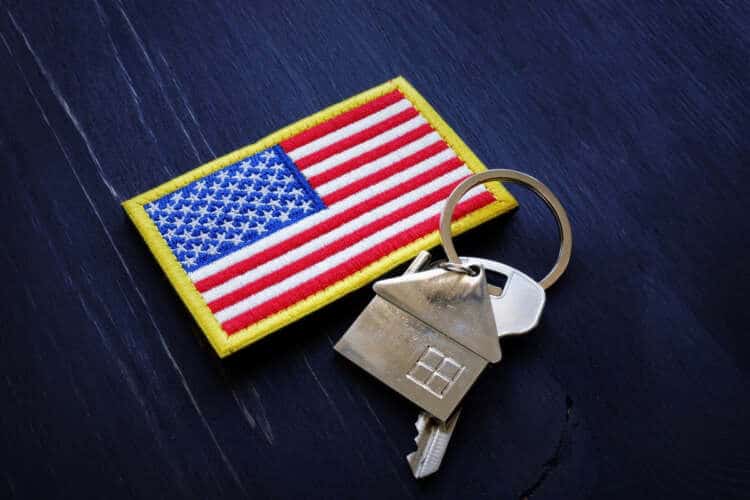What Sellers Should Know About VA Loans
Updated: May 1, 2023
The VA loan is an outstanding option for military and veteran home buyers. But are there any benefits–or drawbacks–for home sellers?
Here’s what sellers should know about VA home loans.
VA Loan Overview
The Department of Veterans Affairs administers the VA loan program, but VA-approved lenders (e.g., banks, credit unions, and mortgage companies) originate the loans. Loan origination refers to the whole lending process, beginning with your loan application and ending with your purchase.
Through this system, the VA guarantees VA loans. If a borrower defaults, the VA refunds a portion of the outstanding loan balance to the lender.
This VA insurance encourages lenders to provide competitive VA loan terms to veteran homebuyers.
VA loan benefits for veteran borrowers include:
- No down payment required
- No private mortgage insurance (PMI) required
- Lower interest rates
- Streamlined refinancing option via the Interest Rate Reduction Refinance Loan (IRRRL)
Pros and Cons of VA Loans for Sellers
Selling to a VA loan buyer parallels selling to any other buyer. However, the VA loan process has nuances that sellers should understand. Here are some pros and cons of working with VA loan buyers compared to conventional loan buyers.
Pros of Selling to VA Loan Buyers
From the seller’s perspective, a few characteristics make VA loan buyers more appealing than conventional loan buyers.
- Less stringent underwriting criteria: Because the government guarantees VA loans, VA-approved lenders can use looser underwriting criteria. Typically, borrowers can qualify with lower credit scores and higher debt-to-income ratios with a VA loan relative to a conventional one. So, if you compare two buyers with similar financial profiles, the one using a VA loan may have an easier time qualifying for a loan than the one using a conventional loan.
- More reliable closing statistics: While VA loans do require some extra steps, they close at a higher rate than their conventional counterparts, according to Ellie Mae, a mortgage application software company. In June 2021, 70% of VA loans reached closing, compared to 51% of all mortgages, Ellie Mae said. No closing is guaranteed, but higher closing statistics may give sellers confidence when closing with a VA home loan buyer.
- Increased purchasing power: With a conventional loan, buyers need between 3% and 20% down payments. Down payment requirements present an obstacle to many potential buyers, even if they have qualifying income and credit. VA loans don’t require a down payment. Because of this, borrowers tend to have more buying power, as their down payment requirement doesn’t increase with the purchase price.
Cons of Selling to VA Loan Buyers
Some VA loan elements can make them more challenging for sellers than working with conventional loan buyers. But, getting an understanding of these characteristics makes selling to VA loan buyers easier.
- VA Minimum Property Requirements (MPRs): The VA loan program exists to promote homeownership for veterans and active service members. Accordingly, the VA mandates that properties meet its baseline habitability standards. These minimum property homes must be safe, sound and sanitary. The VA will not approve the loan if a home fails to meet MPR.
- VA appraisals: Related to MPRs, a VA appraiser must also evaluate the home. VA appraisals confirm property value and check for MPR compliance. The appraiser will send a final evaluation report to the VA for review. If the report flags any MPR violations, the VA will not approve the loan until the buyer or seller resolves these issues.
NOTE: If you’re selling a home in an area with many veterans and military members, there’s a good chance you’ll need to deal with MPRs and VA appraisals. Some real estate agents specialize in VA loan purchases. Agents familiar with the VA loan process can help you ensure your home is as ready as possible for the VA appraisal process.
Are VA Loans Bad for Sellers?
Aside from fears over the VA loan appraisal process, some sellers may be worried about VA loan closing times. The reality is, VA loans may take between 40 and 50 days to close, according to Veterans United Home Loans. This is on par with the closing times for many conventional loans.
Power of Attorney Purchases
Military members must often travel or deploy. Some military families may try to purchase a home at their next duty station while still living at their current duty station.
Service members who can’t purchase a home in person may use a power of attorney to close their VA loan. Closing a sale with a power of attorney shouldn’t pose any additional issues for the seller, as long as sellers know that someone besides the buyer might be present at the closing.
Support Veteran Homeownership and Increase Your Buyer Pool
Sellers should keep their buying pool as large as possible to capitalize on their home’s resale value. With that in mind, don’t exclude VA loan buyers because of rumors and myths about the VA home loan closing process.
Additionally, when you sell to a VA loan buyer, you support veteran and military homeownership. While this provides no practical financial benefit to sellers, it may provide some sentimental value.
Because of VA occupancy requirements, you’ll know your buyer is actually living in the home, and not just purchasing it to rent out or flip.
The VA home loan exists to support veteran homeownership – not investing. The VA requires buyers to move into their home within 60 days and occupy it as their primary residence for at least a year.
When you sell to a VA loan buyer, you’re helping someone who has served our country find a home.
Most Popular VA Loans and Mortgages Articles

VA Home Loan Guide

VA Loan Calculator

How to Refinance a VA Loan

VA Loan Certificate of Eligibility (COE)

2024 VA Loan Limits by County

Best VA Loan Lenders
































































